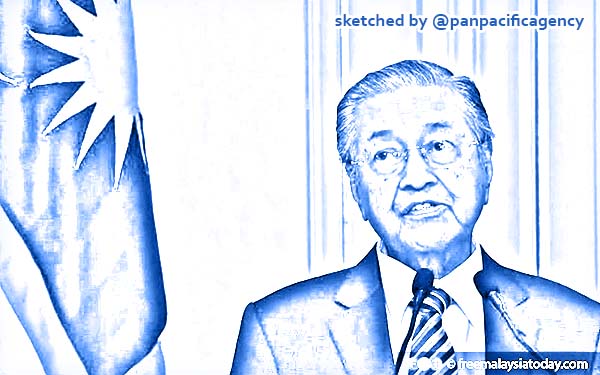Malaysia’s former leader Mahathir wants to wrestle back power

Photo by the Free Malaysia Today. Sketched by the Pan Pacific Agency.
KUALA LUMPUR, Jun 30, 2020, CNBC. Former Malaysian Prime Minister Mahathir Mohamad wants to take down the current government — just months after his resignation from the top job resulted in the collapse of the previous administration that he led, CNBC reported.
But the coalition of now-opposition parties can’t agree on who should be prime minister if they succeed in wrestling back power. Mahathir had initially wanted to return as prime minister, but was reportedly rejected by opposition leader Anwar Ibrahim.
Anwar was a deputy prime minister during Mahathir’s first stint as Malaysia’s leader. But the two men turned rivals after Anwar was sacked and charged with sodomy and corruption — before they patched up and formed an alliance to take down the government of the day in the 2018 elections.
Mahathir became prime minister for the second time after the elections, and had promised to hand over the reins to Anwar before the end of the five-year term. But the elder statesman, who will turn 95 next month, unexpectedly resigned from his position in February — which paved the way for current Prime Minister Muhyiddin Yassin to assume power.
The nonagenarian has sought to challenge Muhyiddin’s claim to the top job through a no-confidence motion in parliament, arguing that the current prime minister — who’s a former ally — may not have the majority support of the 222-seat chamber. But Malaysia’s parliament has so far only convened for an address by the king.
“The new prime minister claims that he has the majority, but he’s so worried about his majority that parliament has not been allowed to sit. When the parliament was opened by the king, only the speech of the king was heard, no debates were allowed,” Mahathir told CNBC’s “Street Signs Asia” on Tuesday.
“So he is still unsure of himself whereas the country needs a strong hand to handle the many problems including the … pandemic,” he added, referring to the coronavirus disease — or Covid-19 — which has spread globally.
The next parliamentary sitting is scheduled for July, and analysts have warned that any further delays could hinder the government’s response to challenges posed by the coronavirus outbreak and its economic implications.
Racial politics
In a twist over the weekend, Mahathir declared in a video posted on his social media channels that he’s supporting Shafie Apdal — a political leader from the East Malaysian state of Sabah — to be the next prime minister. None of the opposition parties have officially endorsed the proposal, according to local media reports.
When CNBC asked Mahathir why isn’t he backing Anwar, the opposition leader, to be the next prime minister, he said: “He is not very popular with the Malays.”
“It has been shown that the support of the Malays is very important for any party to win the election, and because he’s not very popular — being the leader of a multi-racial party — he needs somebody who’s leader of the Malays to help him win the election,” Mahathir added.
Ethnic Malays, who make up over 60% of Malaysia’s population, are an important vote bank for political parties — some of which have long played up the race card to shore up support.
For example, Mahathir’s political opponents led a backlash against his government’s pledge in 2018 to ratify a United Nations convention against racial discrimination. They claimed that the move could dilute the privileges of indigenous people — which include the ethnic Malays — protected under the country’s constitution. The government walked back on its pledge.
Economists have long warned that Malaysia’s long-term economic growth could be hampered by such policies favoring ethnic Malays, which has caused a significant brain drain in the country as individuals from the minority groups search for better opportunities overseas.
CNBC’s Nancy Hungerford asked Mahathir for his stance on race-based inequality, given the recent global focus on the issue, but the politician didn’t answer the question and instead spoke about the country’s coronavirus outbreak.